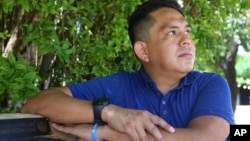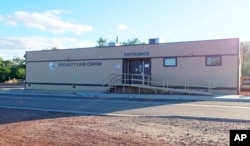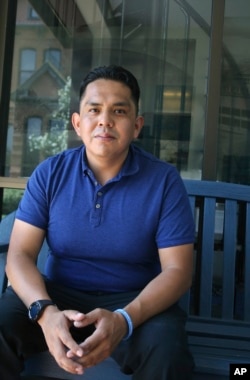Colon cancer has affected several members of Loren McCabe’s family.
His great-grandmother was diagnosed too late to fight it. His grandfather did not want to travel to get treatment because he felt better protected within the Navajo Nation’s four holy mountains.
McCabe’s mother, too, died of the disease. She chose to get treatment so she would have a chance to see her son finish college. But the medical center was very far away from the reservation where she lived.
None of McCabe’s family members had the choice of being treated on their reservation. The same is true for Native Americans across the country, even though they have higher rates of some kinds of cancer than most other populations.
One hospital is hoping to change that. The hospital, on the rural Navajo Nation, now has a cancer treatment center that offers chemotherapy and testing. It is also sensitive to different cultural belief systems.
The new center is at the Tuba City Regional Health Care Corporation. It welcomed its first patient last month.
Native Americans across the country depend on the federal Indian Health Service or IHS for medical care. But the agency only pays for general care and sends patients to other medical centers for specialty care, such as for cancer.
The Tuba City hospital operates under a contract with IHS. But it used money it raised to open the cancer treatment center. The hospital’s chief executive, Lynette Bonar, said the center is the first of its kind on any Native American reservation.
Medical centers on reservations offer limited services. Those living on reservations or in rural areas often face additional barriers in health care. These include a lack of culturally sensitive care, healthful food and fresh vegetables and long term medical professionals, said Melissa Buffalo. She is with the American Indian Cancer Foundation, based in Minneapolis, Minnesota.
Buffalo said, “Not too many Native people we know can say they don’t have a family member who has been impacted by cancer or a relative who has died from cancer.”
For Loren McCabe’s mother, Victoria, the lack of treatment choices on the Navajo Nation meant a lot of travel time. She would travel each week at least one hour from her home in Ganado, Arizona, to Gallup, New Mexico. Sometimes she went even farther to Albuquerque, New Mexico — more than three hours by car each way. She sometimes needed treatment two times a week, McCabe said.
His younger sister became their mother’s main caregiver. McCabe said he worked three jobs to help support his family while also going to college in Phoenix, Arizona.
The day before McCabe's college graduation in 2013, Victoria learned her cancer had spread. She did not tell her son until after the ceremony. She decided to stop her treatment, and died nine months later.
McCabe said he often thinks about the tension that the long trips caused his mother. She would tell him, “I hate doing this.”
“Having a treatment center on the reservation alleviates a lot of that burden,” McCabe said. “Your body is already going through so much.”
Until recently, no cancer doctors had ever worked on the Navajo Nation — a 69,930-square-kilometer area of New Mexico, Arizona and Utah. Now there are two such doctors.
Navajos generally have lower rates of prostate, lung and breast cancer than other populations in the United States. But they are seven times more likely to die from gallbladder cancer, four times more likely to die from stomach cancer and about two times more likely to die from kidney cancer. Those numbers come from the Navajo Epidemiology Center, which gathered information from 2005 to 2013.
Some experts connect the higher rates of such diseases to the hundreds of uranium mines that operated for years on the Navajo Nation. But, no major studies so far have linked cancer to contact with radiation from uranium waste.
Bonar noted that the Tuba City cancer center still faces financial difficulties. The state of Arizona agreed to pay back the costs of specialty drugs. But federal legislation is needed to have the IHS pay for the costs of specialized cancer treatment.
The hospital also is raising money to expand services beyond chemotherapy so patients can also receive radiation, imaging tests to find cancer and other kinds of treatment, Bonar said.
At a gathering of possible donors in Arizona, Jill Biden — wife of presidential candidate and former Vice President Joe Biden — urged people to give money. She said it would help deal with a lack of cancer treatment in areas where poverty and unemployment are high.
“Poverty draws a line between surviving and succumbing to this disease," Biden said, "and it doesn’t have to be that way.”
I’m Ashley Thompson.
The Associated Press reported this story. Ashley Thompson adapted it for VOA Learning English. Caty Weaver was the editor.
______________________________________________________________
Words in This Story
chemotherapy - n. the use of chemicals to treat or control a disease (such as cancer)
impact - v. to have a strong and often bad effect on (something or someone)
graduation - n. the act of receiving a diploma or degree from a school, college, or university
alleviate - v. to reduce the pain or trouble of (something) : to make (something) less painful, difficult, or severe
burden - n. something that is very difficult to accept, do, or deal with
succumb - v. to die











